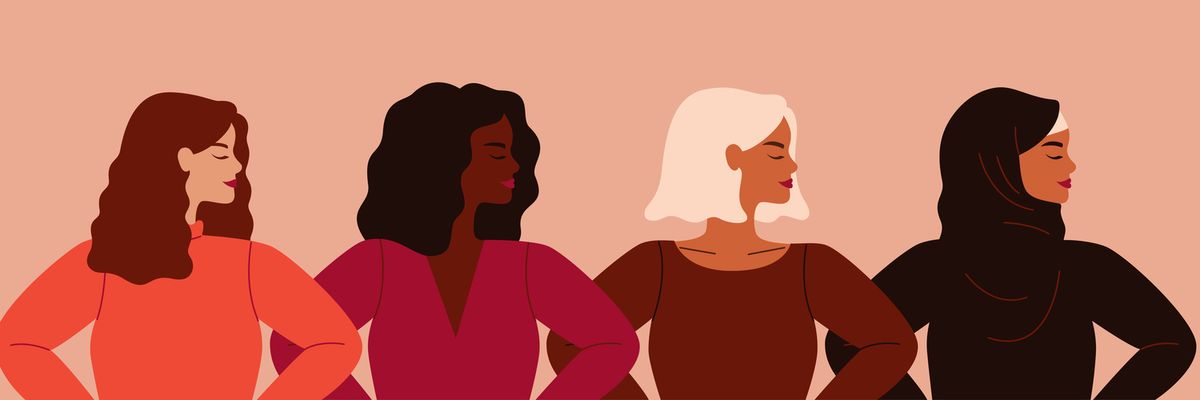In the 2019 Influencer Marketing Rate Report, Klear reported that female influencers were paid 33% less than male influencers. As of March 2020, female influencers made up 84% of the industry and the gap had widened. The findings from Klear have been supported by a 2020 study from HypeAuditor – which also identified a pay gap between genders.
Moreover, Black female influencers have been paid up to ten times less than their non-POC counterparts for the same work. Whilst LGBTQ+ influencers, and influencers with disabilities have been paid with ‘exposure’ instead of their standard rate by brands.
The influencer pay gap has been discussed by high-profile influencers in the UK and US going back as far as 2018. However, an Instagram account created in July 2020 generated headlines globally. The account @InfluencerPayGap, created by Adesuwa Ajayi, encourages influencers to share the rates they were paid for campaigns along with their gender, race, following, and engagement rate. Adesuwa featured in the Talking Influence Influencer 50 2020, as she was recognised as a rising star within the industry for her work.
Adesuwa Ajayi’s influencer pay gap Instagram account now has over 53.3 thousand followers, showing that the platform acts as a safe place for those who believe they aren’t being treated fairly within the influencer marketing sphere to anonymously speak their case.
Minority inclusion is not a trend
Although discussions are taking place, the end goal has not been reached in terms of closing the influencer pay gap, focusing on gender and race in particular. In the influencer pricing report from SevenSix, which was released yesterday (3rd March), they included a comment from one agency that said: “[Brands] can’t just switch it [diversity] on and magically expect profits to come from BAME audiences. It takes time, trust, authenticity.”
Rahul Titus, head of influence at Ogilvy, is passionate about continuing the discussion surrounding the influencer pay gap. He believes that it is a great step to acknowledge that there is in fact an influencer pay gap, but we are still just on the surface regarding the matter.
Rahul adds that minorities within the influencer marketing industry need ‘cheerleaders’ – as those who feel like they are being unfairly treated may not often be seen to have the loudest voices. There are enough people in authority who can and should take an active role.
Putting the tools in place
Among those supporting the influencer pay gap movement is Fayrli, who has launched a fair pay pledge in conjunction with the upcoming International Women’s Day. Although International Women’s Day celebrates the economic, cultural, and political achievements of women, the day also marks a call to action for eradicating gender income inequality.
Creator of the Fayrli pay gap pledge, media strategist Alex Ighalo, said: “The responsibility does not lie with influencers to bring about change. Influencers should be free to collaborate with businesses safe in the knowledge that they will be paid fairly irrespective of their gender, race, ability, or sexual orientation.”
As Rahul mentioned, it is not just important for influencers themselves and people who are passionate about the cause to raise awareness and have important conversations, but also for large platforms and stakeholders within the industry to support those who feel disregarded or unfairly treated.
- Facebook black creator fund: In August 2020, Facebook, which owns Instagram, announced that they would be introducing a new $25 million funding program to assist black creators – as part of the platform’s ongoing effort to support diversity and inclusion. Applications for the programme were open to BAME creators aged 18+ with a minimum of 10,000 followers on either Facebook or Instagram.
Facebook said: “By participating in this initiative, creators receive the support they need to help them propel their careers to the next level, grow their community of followers and build a business across Facebook Inc’s family of apps.”
- TikTok for Black Creatives incubator program: At the beginning of this year, TikTok introduced its Black Creatives incubator programme. The three-month programme, which is still taking place, focuses on nurturing, developing, and investing in 100 hand-selected talented black creators, helping them to build their careers using the platform.
TikTok said: “Black creators on TikTok have been a driving force for our community, from starting trends to fostering connection to introducing new ways to entertain and inspire others, and we’re committed to continuing to elevate and amplify their voices.”
- TikTok for international women’s day: In the lead-up to Women’s History Month, commencing on International Women’s Day (8th March 2021), TikTok has announced a range of events that will take place during the month which will celebrate both female creators and women-led businesses on the platform. As TikTok continues to highlight the excellent work of female creators on the app, we can hope to see an increased recognition for women who are creating business entities for themselves – in turn, leveraging their careers, resulting in fairer pay.
Reflection and recognition
Noticing how large stakeholders within the influencer marketing industry, such as TikTok and Facebook, are putting tools in place to support BAME and female creators, will hopefully pave the way for more key players to take an active and committed role in auditing their work. Uncomfortable conversations are important conversations in regards to fair pay and inclusion.
Whereas influencing career has previously been downplayed, with 47% of respondents in SevenSix’s report saying that they feel unconfident when it comes to pricing themselves for paid brand partnerships, the recognition of influencers qualifying for union protection by SAG-AFTRA may help to validate conversations surrounding influencer pay.
Steps in the right direction such as this encourage brands to ensure that paid jobs are fair for both the advertiser and the influencer – working towards an end goal of all influencers being paid based on their work, and not their identity.









